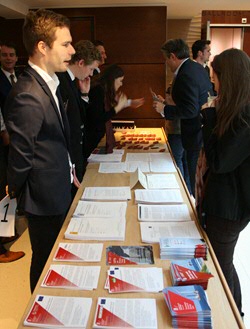Ten Years of Energy Law in Groningen
On 8 December 2017, the Groningen Centre of Energy Law (GCEL) organised a conference in The Hague to celebrate its 10-year anniversary. The conference focussed on The North Sea as a Source of Sustainable Energy and Law and provided an excellent occasion to review the Centre’s achievements and to focus on one of the main research topics of the Centre that will feature prominently in the future: the creation of a hybrid and sustainable energy system in the North Sea.

GCEL’s achievements
Over the last ten years GCEL has been involved in a wide range of teaching and research activities. Currently the Centre provides three teaching programmes. It has been able to develop a LLM programme on Energy & Climate Law which is attracting more students each year from a large variety of EU and non-EU states. Also the executive programmes are gradually expanding. The course ‘Energierecht op Locatie’ has been organised several times and is becoming increasingly popular. An unique feature is the North Sea Energy Law Programme (NSELP), which is an accredited joint degree in energy law offered by the Universities of Groningen, Oslo, Aberdeen and Copenhagen. It is a two years’ part-time programme for professionals and students coming from Europe, Africa and South America.
Research has also flourished over the past years. A large number of PhD researchers is working at GCEL on a variety of issues involving energy and climate law topics. On average on PhD has been defended each year. The Centre is also involved in many externally funded research projects, ranging from specially funded industry project like EDGAR and Cato, NWO projects (Energy Transition and Smart grids), TKI projects (Offshore wind and system integration), Horizon 2020 projects (Promotion, SMILE and Store & Go) and more recently an ERA-NET project called Align.

The North Sea as a Source of Sustainable Energy and Law
The conference on the North Sea as a source of sustainable energy law was organised by the Groningen Centre of Energy Law in cooperation with the Faculty of Law’s Research Programme on Energy & Sustainability. Some 100 participants from various professional and geographical backgrounds attended the conference at the Hilton Hotel in The Hague.
Prof. dr Martha Roggenkamp (director GCEL) and dr Edwin Woerdman (co-director) opened the conference and briefly outlined the past achievements and the reason for choosing the North Sea as the conference theme. Rene van der Meer (ENGIE) presented an overview of the energy activities in the North Sea and the challenges that ly ahead for future of energy production at the North Sea and the need for system integration options. Thereafter Prof. dr Kars de Graaf (University of Groningen) focussed on how the law plays a role in coordinating and planning all these offshore uses. This includes the construction and use of offshore wind energy and subsea interconnectors. The PhD candidates Joris Gazendam and Ceciel Nieuwenhout (University of Groningen) concluded the first part of the conference by assessing the legal intricacies of combining offshore wind with subsea interconnections.
After the break, the focus shifted to the North Sea Wind Power Hub, a proposed artificial island near the Doggersbank for the purpose of creating an interconnected and sustainable offshore energy system. The technical-economic characteristics and rationales behind the island were introduced by Maarten Dirkes (TenneT. Thereafter Prof. dr Frans Nelissen (University of Groningen) assessed the extent to which the international law of the sea allows for the construction and use of such an artificial island. Developing offshore energy projects requires major investments. PhD candidate Jaap Waverijn (University of Groningen) discussed the legal peculiarities of offshore investments, the legal hurdles and potential solutions. Maarten Vermeer (Gasunie and NSELP alumnus) provided the audience with a different North Sea perspective by presenting his experiences as a participant in the NSELP. The official part of the conference was concluded by prof. dr Jan Berend Wezeman, the dean of the Faculty of Law of the University of Groningen, who kindly congratulated GCEL with its achievements and a successful conference. The 10 years celebration ended with drinks and a guided tour through the museum Panorama Mesdag, which provided the participants with a sunny view of the North Sea on a cold winter day in December.
| Last modified: | 19 January 2024 08.07 a.m. |
More news
-
05 March 2025
Women in Science
The UG celebrates International Women’s Day with a special photo series: Women in Science.
-
04 February 2025
'To entice is okay, to mislead is not'
In the supermarket, there is a carton of ‘blackcurrant juice’. At least, that is what it is called and what the picture on the packaging suggests. The list of ingredients, however, states that the contents are mainly made of apples and grapes. Is...
-
23 January 2025
Two UG researchers join The Young Academy
Prof. Björn Hoops and Dr Esther Metting are joining The Young Academy (De Jonge Akademie, DJA) of the Royal Netherlands Academy of Arts and Sciences (Koningklijke Nederlandse Akademie van Wetenschappen, KNAW). Every year, the DJA selects 10 talented...
